- Home
- Lloyd Alexander
Taran Wanderer (The Chronicles of Prydain) Page 18
Taran Wanderer (The Chronicles of Prydain) Read online
Page 18
“Well met, Lord Swineherd,” Dorath said between mouthfuls.
“Ill-met, Dorath,” Taran cried, drawing his sword. “Will you call your Company to set upon us? Call them, then, all who fled us at Commot Isav!” He raised the weapon and strode forward.
Dorath laughed harshly. “Will you strike before my own blade is out?”
“Draw it, then,” Taran flung back at him.
“So I shall, when my meal is done,” Dorath said. He gave a scornful grunt. “Your blade is ill-favored, swineherd, uglier than Gloff’s face.” He grinned slyly. “Mine is the fairer weapon, yet gained at no cost. My Company?” he added. “Would you have me call them? They are deaf. For half of them, the dirt of their graves stops their ears. I saw you at Isav, and guessed it was you who rallied the Commot clods. Alas, I had no time to linger and pay my greetings to you.”
Dorath wiped his mouth on the back of his hand. “Of those who rode from Isav, two cowards fled and I’ve seen none of them. Two were heavily wounded. Those, I myself sped on their journey to the carrion crows, and they burden me no longer. But no matter. I’ll soon find others to join me.
“Meantime, so much the better,” he went on. “I’ll share your treasure with none but myself.”
“Treasure?” Taran cried. “There is no treasure! Draw your blade, Dorath, or I’ll kill you unarmed as you’d have done to me.”
“An end to your lying, swineherd,” Dorath growled. “Do you still take me for a fool? I’ve known of your travels, and the bent path you followed here did not deceive me. Your saddlebags hold nothing of worth; I’ve seen that for myself. So the prize is yet to be claimed.”
He strode to the Mirror. “Is this your trove? What have you found, swineherd? A mud puddle? What does it hide?”
Taran cried out, though before he could fling himself upon Dorath, the warrior stamped his heavy boot into the pool and, with a curse, sent the water spurting from the basin.
“It holds nothing!” Dorath burst out, his face twisting in rage.
Taran gasped and stumbled forward. Dorath drew his sword.
“My meal is ended, swineherd,” Dorath cried.
He struck heavily and the force of his onslaught sent Taran reeling from the cave. Gurgi yelled in fury and clutched at the warrior, who seized him with a powerful grasp and dashed him against the rocky wall. Snarling, Dorath sprang after Taran.
Scrambling to his feet, Taran brought up his blade to meet the warrior’s attack. Dorath spat and lunged again, driving Taran toward the slope. As the warrior bore closer upon him, Taran lost his footing, stumbled backward, and dropped to one knee.
With a mocking laugh Dorath raised his weapon, and Taran saw the blade that once had been his own glint sharply as Dorath swung it down with all his strength. Taran saw his death upon him and flung up his sword in a last attempt to ward against the blow.
The blades met with a grating, ringing clash. Taran’s weapon shuddered in his hand, the shock threw him to earth. Yet his blade held. The sword of Dorath shattered on it.
Cursing, Dorath flung the useless hilt at Taran’s face, turned and ran to the cover of pines along the shore. Hearing her master’s whistle, Dorath’s sorrel mare broke from the trees. Taran sprang to pursue the fleeing warrior.
“Help, help!” Gurgi’s voice cried from the cave. “Kindly master! Oh, help wounded Gurgi!”
Hearing this Taran halted even as Dorath leaped aside his mount and galloped away. Taran raced to the cave. Within, Gurgi moaned and tried to sit up. Taran knelt quickly and saw the creature’s forehead was heavily gashed, but that Gurgi’s pain came more from terror than from his hurts. He carried him from the cave and propped him against a boulder.
Taran did not return to the Mirror of Llunet. Already he had seen it empty, its spattered water spread over the stones, holding only the muddy print of Dorath’s boot. He sank down beside Gurgi and put his head in his hands. For long he did not move or speak.
“Come,” he said at last, helping Gurgi to his feet. “Come. We have far to journey.”
A light glowed in Annlaw’s hut. The night was nearly spent, yet Taran saw the potter still bent over his wheel.
Annlaw rose to his feet as Taran slowly crossed the threshold. Neither spoke for some while. The potter anxiously studied Taran’s face, and said at last, “Have you looked into the Mirror, Wanderer?”
Taran nodded. “For a few moments. But none shall look in it again. It is destroyed.” He told of Dorath and the happenings at the Lake of Llunet. When Taran had done, the potter sadly shook his head.
“You saw nothing then?” said Annlaw.
“I learned what I sought to learn,” Taran replied.
“I will not question you, Wanderer,” said Annlaw. “But if it is in your heart to tell me, I will listen.”
“I saw myself,” Taran answered. “In the time I watched, I saw strength—and frailty. Pride and vanity, courage and fear. Of wisdom, a little. Of folly, much. Of intentions, many good ones; but many more left undone. In this, alas, I saw myself a man like any other.
“But this, too, I saw,” he went on. “Alike as men may seem, each is different as flakes of snow, no two the same. You told me you had no need to seek the Mirror, knowing you were Annlaw Clay-Shaper. Now I know who I am: myself and none other. I am Taran.”
Annlaw did not reply immediately. Then he said, “If you have learned this you have learned the deepest secret the Mirror could tell you. Perhaps it was truly enchanted after all.”
“There was no enchantment,” Taran answered. He smiled. “It was a pool of water, the most beautiful I have seen. But a pool of water, no more than that.
“At first,” he went on, “I thought Orddu had sent a fool on a fool’s errand. She did not. She meant me to see what the Mirror showed me. Any stream, any river, would have given me the same reflection, but I would not have understood it then as I understand it now.
“As for my parentage,” he added, “it makes little difference. True kinship has naught to do with blood ties, however strong they be. I think we are all kin, brothers and sisters one to the other, all children of all parents. And the birthright I once sought, I seek it no longer. The folk of the Free Commots taught me well, that manhood is not given but earned. Even King Smoit in Cantrev Cadiffor told me this, but I did not heed him.
“Llonio said life was a net for luck; to Hevydd the Smith life was a forge; and to Dwyvach the Weaver-Woman a loom. They spoke truly, for it is all of these. But you,” Taran said, his eyes meeting the potter’s, “you have shown me life is one thing more. It is clay to be shaped, as raw clay on a potter’s wheel.”
Annlaw nodded. “And you, Wanderer, how will you shape your clay?”
“I cannot stay in Merin,” Taran replied, “much as I love it. Caer Dallben waits for me, as it has always waited. My life is there, and gladly I return to it, for I have been too long away.”
They sat silently then: Taran, Gurgi, and Annlaw Clay-Shaper. As dawn lightened, Taran clasped the potter’s hand and bade him farewell.
“Good journey to you, Wanderer,” called Annlaw, as Taran swung astride Melynlas. “Do not forget us, for we shall not forget you.”
“I have the sword I fashioned,” Taran proudly cried, “the cloak I wove, and the bowl I shaped. And the friendship of those in the fairest land of Prydain. No man can find greater treasure.”
Melynlas pawed the ground, impatient, and Taran gave the stallion rein.
Thus Taran rode from Merin with Gurgi at his side.
And as he did, it seemed he could hear voices calling to him. “Remember us! Remember us!” He turned once, but Merin was far behind and out of sight. From the hills a wind had risen, driving the scattered leaves before it, bearing homeward to Caer Dallben. Taran followed it.
Author’s Note
This fourth chronicle of Prydain begins as a gallant, high-hearted quest, which soon becomes more intense and perhaps more essentially heroic than the preceding adventures. For here, Taran comes to
grips with a merciless opponent: the truth about himself. No longer as Taran Assistant Pig-Keeper but as Taran Wanderer, he learns to reshape his life out of his own inner resources; for there must not only be an end to childhood but also a beginning of manhood. This is meant to be a serious tale—in the way that all humor is serious and all fantasy true—and if there is no conventionally happy ending in fairy-tale terms, there is still a most hopeful ending in human terms.
This does not imply any less humor or variety in the story. There is possibly more, as Taran’s journey takes him from one end of Prydain to the other, from the Marshes of Morva to the Free Commots. However, instead of a clash of battle hosts, the underlying conflict between good and evil is stated in individual encounters: King Smoit, boisterous with being alive; Morda, deathlike, scornful of all humanity; Dorath the amoral; Annlaw Clay-Shaper the creator; Craddoc, in whose desolate valley Taran suffers the anguish of shame. The Princess Eilonwy, alas, is present only in memory, though it is hoped readers will miss her as much as Taran does—and the author himself, for that matter.
While certain inhabitants of Prydain were born of Welsh legend, in Taran Wanderer they have acquired characteristics more universal than specific. Morda’s life secret, for example, is familiar in many mythologies. Orddu, Orwen, and Orgoch have appeared in other guises (as might well be expected of them): the Three Norns, the Moirae, the Triple Goddess, and very likely some other transformations they decline to admit. Prydain, of course, is part memory and part dream, the balance favoring the latter.
The Companions have gained many more friends than I had ever hoped, who are willing to follow these tales both as self-contained chronicles and as part of a larger pattern; and to them I promise in time all questions will be answered and all secrets revealed. To some friends of the Companions (especially Gypsy Reeves) I address a plea for clemency; to others, my sincere thanks for their hard but invaluable labor, insight, and encouragement when the straits seemed even more dire to an author than to an Assistant Pig-Keeper; and to all, my warmest affection.
The Chronicles of Prydain
by Lloyd Alexander:
The Book of Three
Taran the Assistant Pig-Keeper assembles a group of companions to rescue the oracular pig Hen Wen from the forces of evil.
The Black Cauldron
Newbery Honor Book
The warriors of Prydain set out to find and destroy the Black Cauldron, the Death-Lord Arawn’s chief instrument of evil.
The Castle of Llyr
Princess Eilonwy is growing up and must learn to act like a lady rather than a heroine among heroes.
Taran Wanderer
Taran faces a long and lonely search for his identity among the hills and marshes, farmers and common people of Prydain.
The High King
Newbery Medal Winner
The final struggle between good and evil dramatically concludes the fate of Prydain, and of Taran who wanted to be a hero.
Also available:
The Foundling and Other Tales of Prydain by Lloyd Alexander Eight short stories evoke the land of Prydain before the adventures of Taran the Assistant Pig-Keeper.
The Prydain Companion:
A Reference Guide to Lloyd Alexander’s Prydain Chronicles by Michael O. Tunnell
Prydain Pronunciation Guide
Achren AHK-ren
Adaon ah-DAY-on
Aeddan EE-dan
Angharad an-GAR-ad
Annuvin ah-NOO-vin
Arawn ah-RAWN
Arianllyn ahree-AHN-lin
Briavael bree-AH-vel
Brynach BRIHN-ak
Caer Cadarn kare KAH-darn
Caer Colur kare KOH-loor
Caer Dathyl kare DA-thil
Coll kahl
Dallben DAHL-ben
Doli DOH-lee
Don dahn
Dwyvach DWIH-vak
Dyrnwyn DUHRN-win
Edyrnion eh-DIR-nyon
Eiddileg eye-DILL-eg
Eilonwy eye-LAHN-wee
Ellidyr ELLI-deer
Fflewddur Fflam FLEW-der flam
Geraint GHER-aint
Goewin GOH-win
Govannion go-VAH-nyon
Gurgi GHER-ghee
Gwydion GWIH-dyon
Gwythaint GWIH-thaint
Islimach iss-LIM-ahk
Llawgadarn law-GAD-arn
Lluagor lew-AH-gore
Llunet LOO-net
Llyan lee-AHN
Llyr leer
Melyngar MELLIN-gar
Melynlas MELLIN-lass
Oeth-Anoeth eth-AHN-eth
Orddu OR-doo
Orgoch OR-gahk
Orwen OR-wen
Prydain prih-DANE
Pryderi prih-DAY-ree
Rhuddlum ROOD-lum
Rhun roon
Smoit smoyt
Taliesin tally-ESS-in
Taran TAH-ran
Teleria tell-EHR-ya
About the Author
Readers who, like Taran, have failed in something at which they very much wanted to succeed may be interested to learn about Lloyd Alexander’s similar disappointment. He admits, “I once did indeed work with clay at the potter’s wheel, but though I loved the craft as much as Taran did, my own efforts turned out even worse than his.”
Lloyd Alexander was born and raised in Philadelphia. As a boy he decided that he wanted to be a writer. “If reading offered any preparation for writing, there were grounds for hope. I had been reading as long as I could remember. Shakespeare, Dickens, Mark Twain, and so many others were my dearest friends and greatest teachers. I loved all the world’s mythologies; King Arthur was one of my heroes; I played with a trash-can lid for a knightly shield, and my uncle’s cane for the sword Excalibur.”
During World War II, Mr. Alexander trained as a member of an army combat intelligence team in Wales. This ancient, roughhewn country with its castles, mountains, and its own beautiful language made a tremendous impression on him, but not until years later did he realize that he had been given a glimpse of another enchanted kingdom.
After the war, while attending the University of Paris, he met his future wife, Janine. They were married, and moved back to Philadelphia, where Mr. Alexander wrote novel after novel. It was seven years before his first novel at last was published. Ten years later, he tried writing for children. It was, Mr. Alexander says, “the most creative and liberating experience of my life. In books for young people, I was able to express my own deepest feelings far more than I could ever do in writing for adults.”
While doing historical research for a Welsh episode in his first children’s book, Time Cat, he discovered such riches that he decided to save them for a whole book. He delved into all sorts of volumes, from anthropology to the writings of an eighteenth-century Welsh clergyman to the Mabinogion, the classic collection of Welsh legends. From his readings emerged such characters as Gwydion Son of Don, Arawn Death-Lord of Annuvin, Dallben the old enchanter, and the oracular pig Hen Wen. The landscape and mood of Prydain came from Mr. Alexander’s vivid recollections of the land of Wales that had so enchanted him twenty years earlier.
The five books in the Chronicles of Prydain are The Book of Three (an ALA Notable Book), The Black Cauldron (a Newbery Honor Book), The Castle of Llyr (an ALA Notable Book), Taran Wanderer, and The High King (winner of the 1969 Newbery Medal). He followed the chronicles in 1973 with a collection of short stories, The Foundling and Other Tales of Prydain.
Henry Holt® is a registered trademark of Henry Holt and Company, LLC
Copyright © 1967 by Lloyd Alexander. Renewed 1995.
Map copyright © 1967 by Evaline Ness
Pronunciation Guide copyright © 1999 by Henry Holt and Company
All rights reserved.
Henry Holt and Company, LLC, Publishers since 1866
175 Fifth Avenue, New York, New York 10010
www.HenryHoltKids.com
eISBN 9781429961998
First eBook Edition : July 2011
Library of Congress Cataloging-in-Publication Data
Alexander, Lloyd.
Taran Wanderer / by Lloyd Alexander.
p. cm.—(The chronicles of Prydain; 4)
Summary: The fourth book of the Prydain cycle tells of the adventures that befell
Taran when he went in search of his birthright and the truth about himself.
[1. Fantasy.] I. Title. II. Series: Alexander, Lloyd. Chronicles of Prydain; 4.
PZ7.A3774Tar 1999 [Fic]—dc21 98-40904
Revised Edition—1999

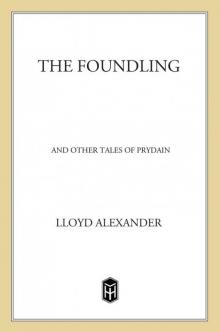 The Foundling and Other Tales of Prydain
The Foundling and Other Tales of Prydain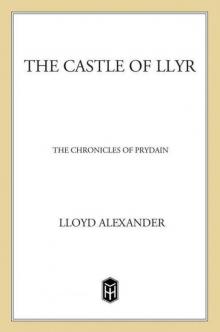 The Castle of Llyr
The Castle of Llyr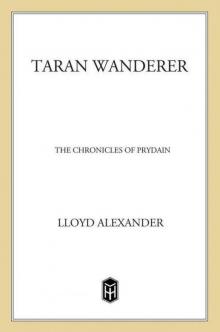 Taran Wanderer (The Chronicles of Prydain)
Taran Wanderer (The Chronicles of Prydain)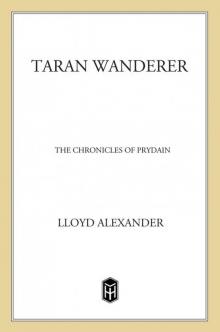 Taran Wanderer
Taran Wanderer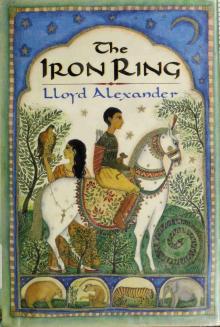 The Iron Ring
The Iron Ring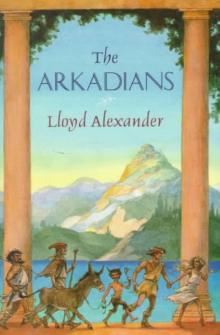 The Arkadians
The Arkadians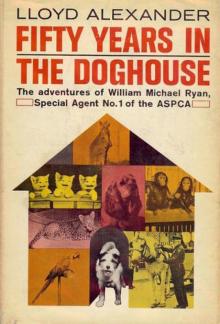 Fifty Years in the Doghouse
Fifty Years in the Doghouse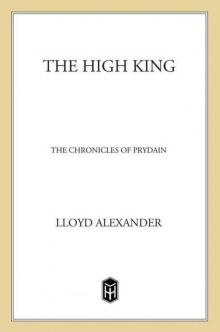 The High King
The High King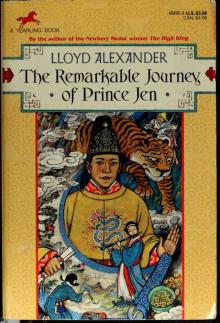 The Remarkable Journey of Prince Jen
The Remarkable Journey of Prince Jen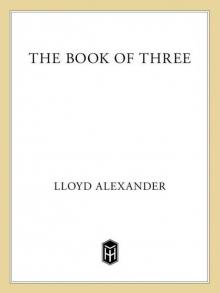 The Book of Three
The Book of Three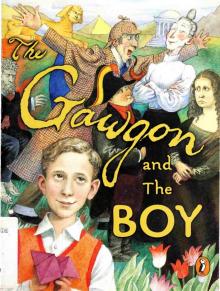 The Gawgon and the Boy
The Gawgon and the Boy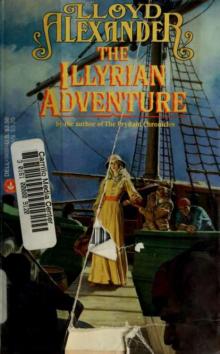 The Illyrian Adventure
The Illyrian Adventure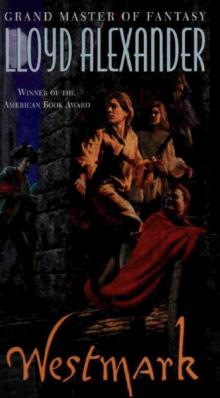 Westmark
Westmark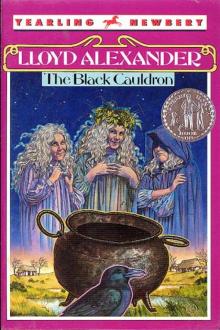 The Black Cauldron
The Black Cauldron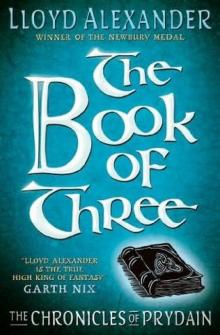 The Book of Three cop-1
The Book of Three cop-1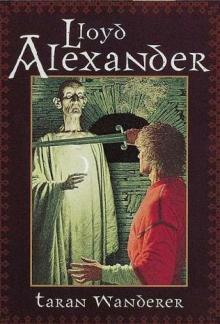 Taran Wanderer cop-4
Taran Wanderer cop-4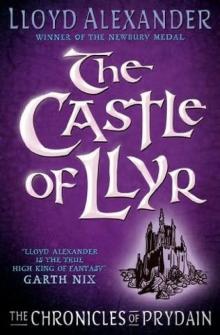 The Castle of Llyr cop-3
The Castle of Llyr cop-3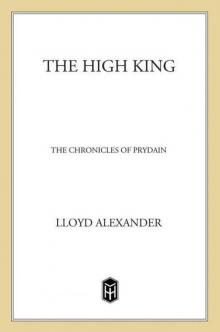 The High King (Chronicles of Prydain (Henry Holt and Company))
The High King (Chronicles of Prydain (Henry Holt and Company))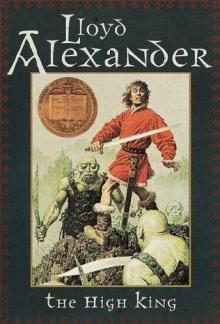 The High King cop-5
The High King cop-5 The Foundling
The Foundling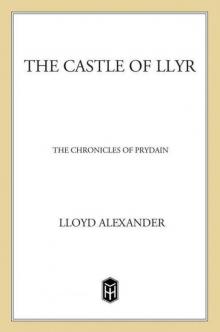 The Castle of Llyr (The Chronicles of Prydain)
The Castle of Llyr (The Chronicles of Prydain)